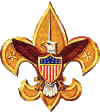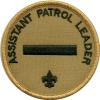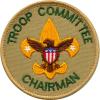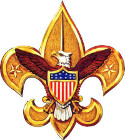
Boy Scout Organization
 Each scout belongs to a Patrol which is a group of 5 to 10 youth, led by a Patrol Leader, one of their own that they elect. The patrol leader is responsible for organizing, motivating, and managing the patrol. The patrol leader represents the interests of the patrol mates when planning activities with other patrols and relays information to the patrol as needed.
Each scout belongs to a Patrol which is a group of 5 to 10 youth, led by a Patrol Leader, one of their own that they elect. The patrol leader is responsible for organizing, motivating, and managing the patrol. The patrol leader represents the interests of the patrol mates when planning activities with other patrols and relays information to the patrol as needed.  The patrol leader appoints an Assistant Patrol Leader to help with the patrol leadership duties. The APL fills in for the PL when needed and is second in command. Some patrols choose to elect an APL at each election and then have that scout move up to PL at the next election.
The patrol leader appoints an Assistant Patrol Leader to help with the patrol leadership duties. The APL fills in for the PL when needed and is second in command. Some patrols choose to elect an APL at each election and then have that scout move up to PL at the next election.  Patrols belong to a Scouts BSA Troop which is led by the Senior Patrol Leader, a scout elected by the troop. This scout has ultimate responsibility for all the scouts in all the patrols in the troop. The SPL runs all troop meetings, delegates responsibilities, and interacts with adult leadership. The SPL should be at least a First Class rank scout and must earn the respect and cooperation of the troop to be successful.
Patrols belong to a Scouts BSA Troop which is led by the Senior Patrol Leader, a scout elected by the troop. This scout has ultimate responsibility for all the scouts in all the patrols in the troop. The SPL runs all troop meetings, delegates responsibilities, and interacts with adult leadership. The SPL should be at least a First Class rank scout and must earn the respect and cooperation of the troop to be successful.  The senior patrol leader chooses another scout that he can work with and that he respects to fill the role of Assistant Senior Patrol Leader. The ASPL fills in for the SPL as needed and helps with running and managing the troop on outings and at meetings.
The senior patrol leader chooses another scout that he can work with and that he respects to fill the role of Assistant Senior Patrol Leader. The ASPL fills in for the SPL as needed and helps with running and managing the troop on outings and at meetings. The SPL and ASPL run the Troop Meetings which are held 2 to 4 times per month. In troop meetings, scouts learn skills, present skits, play games, and prepare for monthly campouts. The SPL also runs the monthly Patrol Leaders Conference - a monthly meeting of all the patrol leaders in the troop - to review activities, plan new events, and delegate tasks to the patrols. This is the main organizational body of a troop.
Troops have from 12 to 100 scouts, with the norm being around 24 to 35. There are around 150,000 Scouts BSA troops and Cub Scout packs across the country.
 Each troop has an adult leader, the Scoutmaster, who is a volunteer registered with Scouting America and trained. The Scoutmaster is responsible for helping the scouts with their planning of the year's program so the scouts are given adequate Opportunity to advance in rank and complete merit badges.
Each troop has an adult leader, the Scoutmaster, who is a volunteer registered with Scouting America and trained. The Scoutmaster is responsible for helping the scouts with their planning of the year's program so the scouts are given adequate Opportunity to advance in rank and complete merit badges.  A troop will be successful if there are also Assistant Scoutmasters to support the Scoutmaster. The adult leaders should only do those things that the scouts can not do themselves - driving, for example. The scouts should be allowed to lead their own troop with only minimal guidance as needed, depending on the maturity and abilities of the scout leaders.
A troop will be successful if there are also Assistant Scoutmasters to support the Scoutmaster. The adult leaders should only do those things that the scouts can not do themselves - driving, for example. The scouts should be allowed to lead their own troop with only minimal guidance as needed, depending on the maturity and abilities of the scout leaders.  The Troop is supported by a Troop Committee, all volunteers. There is a Troop Committee Chairman and other troop committee members. Most troop committees consist of family members and members of the troop's chartered organization. The chartered organization is granted a charter by Scouting America to use the Scouting program. This chartered organization can be a school, service club, religious group, or other group interested in youth. The chartered organization approves the leadership of the troop, provides a meeting place, and operates the troop within the guidelines and policies of that organization and the BSA.
The Troop is supported by a Troop Committee, all volunteers. There is a Troop Committee Chairman and other troop committee members. Most troop committees consist of family members and members of the troop's chartered organization. The chartered organization is granted a charter by Scouting America to use the Scouting program. This chartered organization can be a school, service club, religious group, or other group interested in youth. The chartered organization approves the leadership of the troop, provides a meeting place, and operates the troop within the guidelines and policies of that organization and the BSA. Troops in your area are organized into a District based on geographic boundaries determined by the local Council. At the district level, summer camps, day camps, leader roundtables, and other events are planned. The district supports units through membership, finance, and program services. Your unit has a District Executive and that person helps your troop and patrol get help and resources it needs. There are thousands of districts.
Districts are grouped into a Council. A council is responsible for growing a successful scouting program in its locality. A Council owns camp property and runs summer camps. It also offers fundraising programs, adult training, and service projects to support the troop units. According to the BSA National Council, there are over 300 councils.
Councils in a geographic area are grouped into an Area of which there are 26 in the country. Each area director works with 10 to 15 councils. The area director maintains contact with the Scout Executive in a council and provides support as needed.
Areas are grouped into a Region of which there are 4 in the country. Regional management centers are liaisons between councils and the Scouting America National Council. A region provides direct support to its councils in the areas of fund raising, program, computers, and administration. Regional offices provide direct support services to Area Directors.
BSA National Council, located in Irving, Texas, is the governing body of the scouting program in the United States. They set policy, offer national awards, organize national jamborees, have 3 high-adventure camps, and define the scouting program. There are many helpful resources on their website. On-line registration and membership support, program and literature development, advancement support, liability insurance, and maintaining program consistency across the country are all services provided by the National Council.
Comments:
Nov 02, 2015 - herbert
Scouting 2025 - Ask a Question - Add Content
Just for Fun: Socializing merit badge




Find more Scouting Resources at www.BoyScoutTrail.com



Follow Me, Scouts
Recent Comments